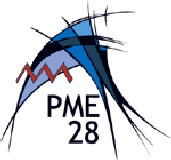


PME28 Bergen, Norway 14–18 July 2004
The 28th International Conference of the International Group for the Psychology of Mathematics Education
Short Orals
A
B
C
D
E
F
G
H
I
J
K
L
M
N
O
P
Q
R
S
T
U
V
W
X
Y
Z
A B C D E F G H I J K L M N O P Q R S T U V W Y © 2004 PME28 Conference Secretariat, Landåssvingen 15, 5096 Bergen, Norway
Applebaum, MarkIdentification of mathematical mistakes by undergraduate students
Attorps, IirisSecondary school teachers’ pedagogical content knowledge
Bairral, MarceloDiversity of geometric practices in virtual discussion groups
Barabash, MaritaDevelopment of Insight of Future Math Teachers as a Result of Follow-up after Development of Mathematical Concepts
Barash, AvivaCo-teaching by Mathematics and Special Education Pre-service Teachers in Inclusive Seventh Grade Mathematics Classes.
Barkai, RuthiIs it a mathematical proof or not ? Elementary school teachers’ responses
Barnes, HayleyInvestigating using the theory of Realistic Mathematics Education to elicit and address misconceptions
Becker, Joanne RossiAn Investigation of Beginning Algebra Students' Ability to Generalize Linear Patterns
Beckmann, SybillaSingapore’s elementary school mathematics texts and current research on whole number operations
Berg, ClaireThe role of learning communities in mathematics in the introduction of alternative ways of teaching algebra
Bobos, GeorgeanaIs Theoretical Thinking Necessary in Linear Algebra Proofs?
Borba, MarceloDistance education in Mathematics
Bosch, M. AsunciónChanging prospective mathematics teachers´ conceptions on assessment: a teacher training strategy
Brendefur, JonathanElementary Students’ Use of Conjectures to Deepen Understanding
De Bock, DirkOvercoming students’ illusion of linearity: the effect of performance tasks
Engelbrecht , JohannComparing assessment modes and question formats in undergraduate mathematics
Evans, JeffMathematics, popular culture and inclusion: some findings and methodological issues
Ferreira, RosaImproving written tests: What do student teachers think about it?
Finnane, MaureenThe role of assessing counting fluency in addressing a mathematical learning difficulty
Francisco, JohnThe Interplay of Students' Views on Mathematical Learning and their Mathematical Behavior: Insights from a Longitudinal Study on the Development of Mathematical Ideas.
Glanfield, FlorenceMathematics Teacher Understanding as an Emergent Phenomenon
Gonzalez, María JoséGeneric and specific competences as a framework to evaluate the relevance of prospective mathematics teachers training syllabuses
Gooya, ZahraWhy the mathematics performance of Iraninan students in TIMSS was unique?
Grainger, Harrycreativity in schools: Interpretations and the problematics of implementation.
Heirdsfield, AnnEnhancing mental computation in Year 3
Huillet, DanielleThe evolution of Secondary School Mozambican teachers knowledge about the Definition of Limits of Functions
Juter, KristinaStudents'conceptions of limits and infinity
Kleve, BodilInterpretation and Implementation of the L97's Mathematics Curriculum
Koyama, MasatakaResearch on the process of understanding mathematics: the inclusion relation among fractions, decimals and whole numbers
Kratochvilová, JanaClassification as a tool for building structure
Kubinova, MarieCharacteristics of the project as an educational strategy
Kwon, Oh NamRetention Effect of RME-Based Instruction in Differential Equations
Kaasila, RaimoThe Connection Between Entrance Examination Procedures and Pre-service Elementary Teachers' Achievement in Mathematics
Leppäaho, HenryDeveloping of mathematical problemsolving at comprehensive school
Lewis, JenniferMathematics Teaching as Invisible Work
Lins, Abigail Fregni (bibi)Cabri-Géometre: Two Ways of Seeing it and Using it
Markovits, ZviaStudents' ability to cope with routine tasks and with number-sense tasks in Israel and in Korea
Matos, Joăo FilipeLearning school mathematics versus being matematically competent – a problematic relationship
Mevarech, Zemira R.Teachers Create Mathematical Argumentation
Mkhize, Duduzile Professionalism in mathematics teaching in south africa are we transforming?
Molina González, MartaIn the transition from arithmetic to algebra: misconceptions of the equal sign.
Mungsing, WanchareeMathematical process: an analysis of the student communication on open-ended problem
Mĺsřval, HeidiStudent Authority in Mathematics Classroom Discourse
Oliveira, IsolinaCelebrating diversity: The role of Mathematics in a curricular alternative to promote inclusion
Oliveira, PauloMight students be knowledge producers?
Pehkonen, ErkkiElementary student teachers’ self-confidence as learners of mathematics
Ponte, Joao-PedroUnderstanding and transforming our own practice by investigating it
Price, AlisonIs it time to let go of conservation of number?
Reynolds, SuzanneA Study of Fourth-Grade Students'Explorations into Comparing Fractions
Rico, LuisQuality in mathematics teachers training syllabuses
Rogalski, JanineAnalysis of teachers' activity for continued design computer-based teaching support. The case of diagnosing studends'algebra competences
Rogalski, MarcProfiles in logic and mathematical performance in calculus tasks by graduate students
Sáenz-Ludlow, AdaliraA Teacher's Method to Introduce Story Problems: Student-Generated Problems
Sakonidis, HaralambosTeachers' management of the epistemological features of mathematics: searching for links with pupils' mathematical knowledge
Saló Nevado, LaiaFarm Mathematics
San Diego, JonathanThe effects of technology on making conjectures: linking multiple representations in learning iterations
Sánchez, Jose GabrielAttitudes towards Mathematics and Mathematics Taught with Computers: gender differences
Schumann, HeinzComputer Graphics Training of Spatial Ability with Direct Manipulation
Sheffet, MalkaHow Pre-Service Mathematics Teachers Understand Percentage Problems
Shin, KyungheeCategory of Students' Justification and its Relation to the Structure of Argumentation: An Analysis of Discourse in Systems of Linear Differential Equations
Skorpen, Leif BjřrnAdapted learning with special focus on the aspect of language in mathematics
Son, Ji-WonProspective Teachers’ Understanding and Representations of Multiplication of Fractions
Southwell, BethLesson study professional development for mathematics teachers
Steward, SusanChanging students' attitudes to mathematics through small group work.
Sumpter, LovisaBeliefs as an influence on mathematical reasoning
Teles, LucíliaColourful maths: from fiction to reality...
Tirosh, ChaimProspective teachers' knowledge of existence theorems
Tunç-Pekkan, ZelhaHow do university professors decide what to teach in graduate level curriculum courses?
Vézina, NancyStudies of the early math strategy: a longitudinal study of teacher development
Villarreal, Mónica EsterUniversity students’ extension of linear models to non-linear situations